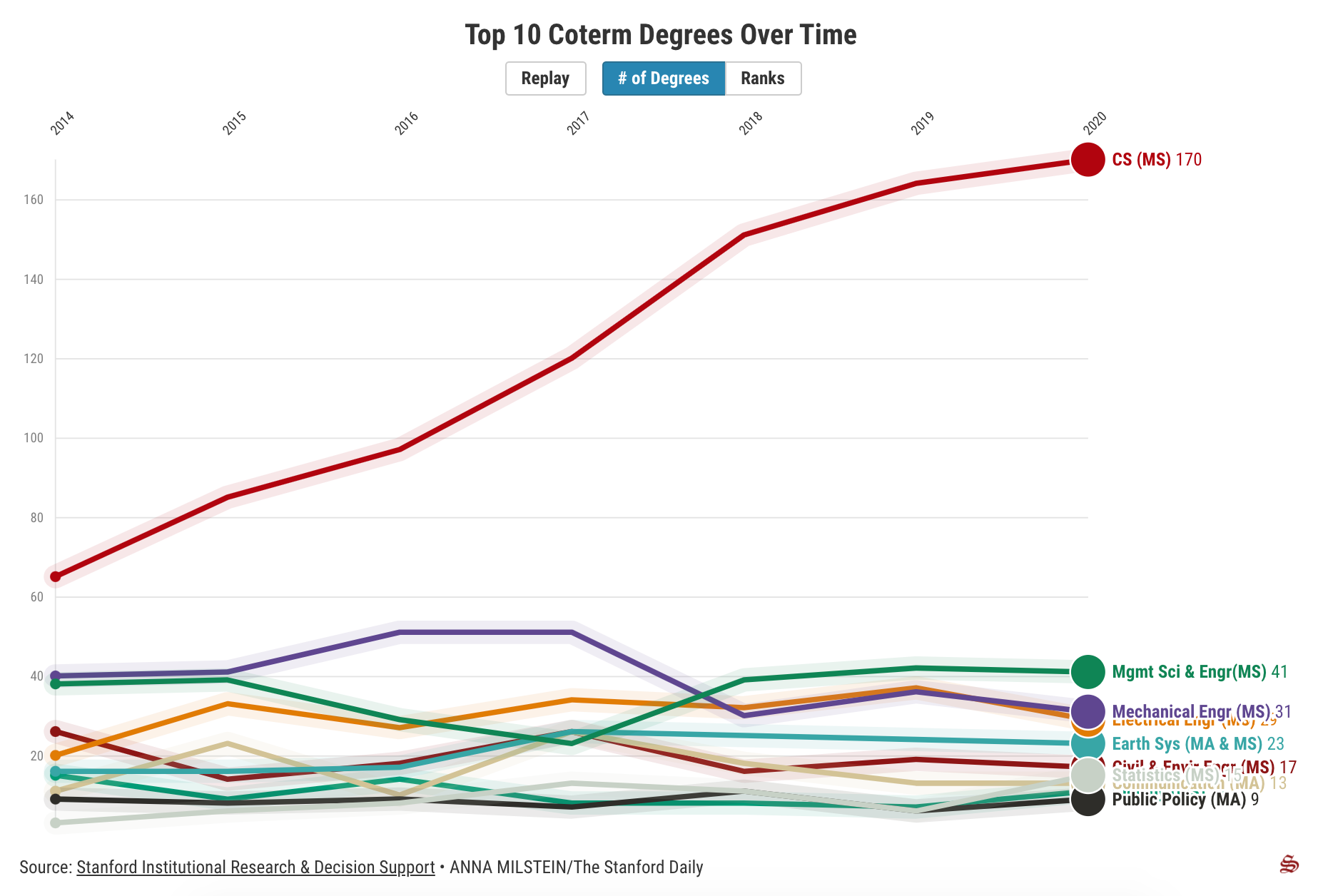Stanford’s coterminal program allows undergraduate students to begin progress towards a master’s degree while completing their bachelor’s degree. Beginning in 1968 in Engineering to increase students’ flexibility and allow them to earn two degrees in approximately five years, Stanford now offers over 50 coterminal programs across its schools, according to University spokesperson E.J. Miranda.
Coterminal, or coterm students must have completed at least 120 units, six non-summer quarters (two for transfer students) and declared their undergraduate major in order to apply. About 30% of each undergraduate class will start a coterm, and approximately one-fifth of all Stanford master’s degrees are awarded through the coterm program.
The number of coterminal master’s degrees awarded per year has increased almost every year since 2014; there was a slight decrease in 2018 following a large uptick in 2017. Nearly 40% more degrees were awarded in 2020 than in 2014, signaling an increase in popularity in the program. The number of active coterm students has exclusively increased since 2014.
The majority of coterminal degrees awarded by the University since 2014 have been Masters of Science. The difference between the number of Masters of Arts and MS degrees awarded has widened over the years. More than seven times as many MS coterm degrees were awarded than MAs in 2020.
Since 2014, Computer Science has been the most commonly pursued coterminal degree, with its popularity increasing over the past few years. The pattern is reflective of the increased popularity of the CS undergraduate major over the past decade and Stanford’s location in the heart of Silicon Valley.
In 2020, the second most popular program was Management Science & Engineering. This program experienced growth in 2018, the same year that there was a drop in the number of Mechanical Engineering degrees conferred. Of the top 10 programs, only Public Policy and Communication exclusively offer an MA. Earth Systems offers both an MA and MS, while every other program is an MS.
The Computer Science coterm is also notable for the high number of undergraduate programs its students come from. Public Policy (MA) and Mechanical Engineering are the only coterm programs in the top 10 that have not had students from more than five different undergraduate majors in a year since 2014.
The most commonly pursued program combinations since 2014 have been CS (BS) to CS (MS) with 528 students, Mechanical Engineering (BS) to Mechanical Engineering (MS) with 180 students and Electrical Engineering (BS) to Electrical Engineering (MS) with 166 students.
The coterm program’s increasing popularity doesn’t appear to be slowing down, despite potential challenges including securing funding and housing. In light of COVID-19, students have reported greater interest in pursuing graduate degrees in order to spend more time on campus and avoid entering the pandemic-stricken economy. Students are attracted to the opportunity to increase potential job prospects by coterming — through deepening their knowledge in a subject or expanding their expertise beyond their undergraduate major — while remaining in the familiar Stanford environment.
Note: Bachelor of Arts (BA) and Bachelor of Arts, Honors program (BAH) have been combined for data analysis and collectively labeled as (BA); Bachelor of Science (BS) and Bachelor of Science, Honors program (BSH) have been combined for data analysis and collectively labeled as (BS). The Science, Technology, and Society BA and BS programs; Earth Systems MA and MS programs; and Sustainability Science and Practice MA and MS programs have been categorized together.
This article has been corrected to note that the Department of Communication is the second program in the top 10 most popular programs to offer exclusively MA degrees. The Daily regrets this error.
